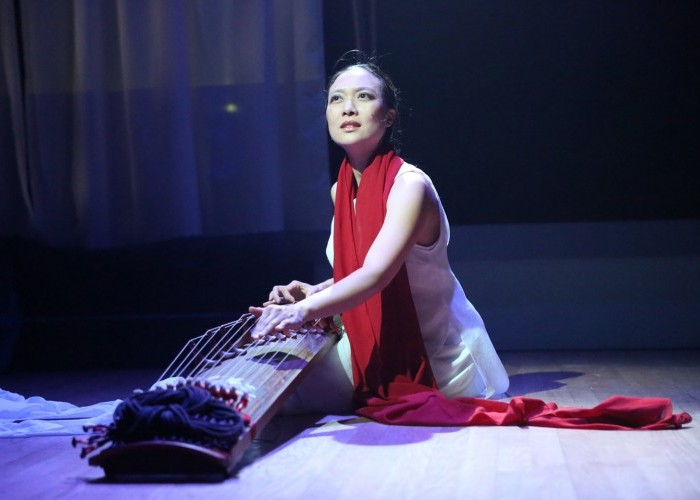Jan 13, 2026 2:09 PM
More Trump-Kennedy Center Cancellations
The fallout from the renaming of the John F. Kennedy Center for the Performing Arts to include President Donald…

“It’s always been there,” multi-instrumentalist and vocalist Jen Shyu said about a wave of vitriol aimed at Asian Americans during the coronavirus pandemic. “These events, they’re just an excuse for people.”
(Photo: Steven Schreiber/pirecordings.com)Jen Shyu is singing over the phone.
It’s a song based on a middle-school diary entry that describes her heart breaking as Shyu realizes how she was seen as different from her classmates: “Dear Diary II, 10:46 p.m., Friday. An 8th grader called me a ‘chink.’ ... I felt degraded and confused ... . Why is there racism?”
As one of only two students of Asian descent in her age group at school, the multi-instrumentalist and vocalist was mercilessly teased for most of her young life. “Basically, by 6th grade,” she recalled, speaking by phone from Queens, under mandated COVID-19 isolation along with a sizable portion of the country, “no one would talk to me. ... [W]hen I won the spelling bee, everyone booed.”
For Shyu, a second-generation American from Peoria, Illinois—whose family has roots in Taiwan and East Timor—she hears echoes of the taunts she endured as a child in the recent strain of anti-Asian harassment that’s flared up alongside the coronavirus outbreak. Reports of Asian Americans being accused of bringing the virus here or being told to go back to where they came from aren’t hard to come by. People using terms like “Chinese virus” or “Kung-flu” hasn’t helped matters, either.
None of the artists interviewed for this story have experienced overt bigotry related to the pandemic, but each expressed a genuine fear of leaving their homes, due as much to the reported uptick in anti-Asian sentiment as their civic duty to flatten the curve.
“It’s always been there,” Shyu said about the recent wave of vitriol. “These events, they’re just an excuse for people. And then you have the president.”
While President Donald Trump stopped using terms like “Wuhan flu” and condemned the surge in hate-speech and assaults against Asian Americans, it seems as if the message already has been sent.
“President Trump is continually trying to build his white-nationalist base of support by fanning up this hysteria,” said pianist and composer Jon Jang, one of the cofounders of Asian Improv aRts. AIR originated in San Francisco during 1987, and today remains committed to exploring Asian identity within American music, launching the careers of Shyu and other notable improvisers and composers, including pianist Vijay Iyer and koto player Miya Masaoka.
Jang’s combative rhetoric comes from a man who grew up during the civil rights era and was inspired by the writings of Malcom X and Amiri Baraka. He discovered and took to heart We Insist! Max Roach’s Freedom Now Suite, Charles Mingus’ “Haitian Fight Song” and other works that became the soundtrack for the movement.
“I was politicized by the music,” said Jang, who began composing to call attention to issues such as reparations for the internment of Japanese Americans during World War II, and the murder of Vincent Chin, a Chinese American who was targeted by disgruntled auto workers blaming Japan for economic hardship in the 1980s. Jang sees the current antipathy toward Asian Americans as part of a long history of anti-Asian hysteria in the U.S. that dates back to the mid-1800s.

Belá Fleck during an interview with Fredrika Whitfield on CNN.
Jan 13, 2026 2:09 PM
The fallout from the renaming of the John F. Kennedy Center for the Performing Arts to include President Donald…

Peplowski first came to prominence in legacy swing bands, including the final iteration of the Benny Goodman Orchestra, before beginning a solo career in the late 1980s.
Feb 3, 2026 12:10 AM
Ken Peplowski, a clarinetist and tenor saxophonist who straddled the worlds of traditional and modern jazz, died Feb. 2…

The success of Oregon’s first album, 1971’s Music Of Another Present Era, allowed Towner to establish a solo career.
Jan 19, 2026 5:02 PM
Ralph Towner, a guitarist and composer who blended multiple genres, including jazz — and throughout them all remained…

Rico’s Anti-Microbial Instrument Swab
Jan 19, 2026 2:48 PM
With this year’s NAMM Show right around the corner, we can look forward to plenty of new and innovative instruments…

Richie Beirach was particularly renowned for his approach to chromatic harmony, which he used to improvise reharmonizations of originals and standards.
Jan 27, 2026 11:19 AM
Richie Beirach, a pianist and composer who channeled a knowledge of modern classical music into his jazz practice,…